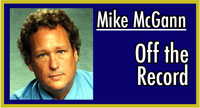By Mike McGann, Editor, UnionvilleTimes.com
My wife is pretty peeved at me right now.
Like a lot of other parents in the Unionville-Chadds Ford School District, she is less than amused at the idea that the district is thinking about outsourcing district school bus services. She’s also not thrilled that I’m not leading the charge against it one these pages.

I’m in the domestic crosshairs because I have to keep the issue at arm’s length as a local news editor. Regardless of my own feelings, I have to be able to see both sides of the argument and present both sides fairly.
For the most part, both the school district administration and the school board seem to be working methodically on this issue, rather than rashly. But it’s hard not to hear those who seem to be pushing for this happen right now and those who seem willing to lie in front of district buses to prevent it from happening.
 The facts are this: the school district is up against it, financially. Even it wanted to, it can’t raise taxes beyond a bare minimum due to state law and thanks to some “interesting” proposals from the Corbett Administration, the district stands to not only lose about $478,000 in state funding, but another $600,000 in matching funding for Federal Insurance Contributions Act (FICA) from the state.
The facts are this: the school district is up against it, financially. Even it wanted to, it can’t raise taxes beyond a bare minimum due to state law and thanks to some “interesting” proposals from the Corbett Administration, the district stands to not only lose about $478,000 in state funding, but another $600,000 in matching funding for Federal Insurance Contributions Act (FICA) from the state.
What was a challenging half-million dollar budget gap is now a gaping $1.1 million wound. Even a maximum tax hike (going from 1% in Chester County to 1.4%) only accounts for about $250,000. That means that $750,000 is going to have to come from somewhere.
So, it’s hard to argue that any option to save money without materially impacting education has to be strongly considered.
But, at the end of the day, is this the best option?
After reading the entire 57-page report from Transportation Advisory Services of Walworth, N.Y. the answer is…I don’t know.
The report, which cost the district $15,000, leaves me with more questions than answers, to be honest, especially when it comes to the bottom line.
Although it suggests the costs of neighboring districts on a per-bus, per-day basis, that’s not the only metric one needs to make a sensible evaluation on costs. Comparing the per-day costs of say, the West Chester Area School District, which has three high schools and a fairly concentrated area of operation as compared to Unionville is a little apples-to-oranges to me.
Where’s the student-mile cost out? That’s the metric used throughout the transportation industry and, at minimum, an important tool to measure true comparable costs. Longer runs, as is the case out to West Marlborough, take both time and fuel, which change the per-bus, per-day cost compared to districts with a lot of shorter runs. Octorara, the lone district with higher costs according to the report, has similar issues, so it makes me wonder. But then again, so should Oxford and Owen J. Roberts — both of which have lower costs than Unionville — so I’m left without the information to have a rational opinion.
No one from TAS responded to a request for clarification on this issue and whether it was a flaw in the report or in the specifications of the original Request For Proposal by the district. And while it might seem petty, the report is chock full of grammatical errors, which makes me worry that proper care wasn’t taken in its preparation.
So while some might suggest that the folks at TAS are leading experts in the field and we should assume that they know what they’re talking about, I’ve been around the block too many times to just accept anything at face value. Without a real way to evaluate the savings, it’s hard to know whether the district could manage similar savings by improving efficiency.
Now, some more facts: There’s about 86 employees impacted by whatever the decision ends up being. The vast majority live in the Unionville area and pay local property taxes. There is universal agreement that they do an excellent job and often serve as an extension of the educators in the school building, as the first and last district employees students see every day.
If we push them out the door, that might send more local folks out of work, which means less local taxes paid, potentially more foreclosures on homes and the resultant cycle of lowered property values which has lowered tax revenue.
So where’s the break-even point? What’s the net cost?
Couple that with what will undoubtedly be lesser service — at minimum the personal connection students have with drivers will be lost — and how is all of this being quantified?
We don’t know. And the problem with outsourcing busing is that it would be frightfully expensive to undo, so those making the decision to do so have to be able to show not just the short-term bottom line, but how it changes the numbers over a decade and the impact for employees, parents and students.
It may be that it’s the right call at the end of the day, a necessity, a sacrifice made to preserve other parts of the educational program. But it may also prove to be little in the way of cost savings, this report notwithstanding.
This is a case where getting it right is more important than getting it done quickly. Too much, literally, is riding on this decision.







I am not sure what the answer should be in the end. However, a Krapf manager made an interesting point to me in a conversation the other day. When they take over a district, they hire back all the local bus drivers at their current salaries. The difference is that they don’t provide benefits for a part time job. That is how they save money. Our district could actually do that by itself. We don’t need to hire an outsider to do this. I hate to take a benefit away from someone. However, we can’t provide benefits for part time workers. There just isn’t enough money to do that. And I am truly sorry for those that are hurt by this process.
Dr. Price,
Balancing this year’s budget by lopping off 80 or so Transportation employees is far different from decisions required to correct the problems with Social Security. We have been valued employees for years and now find ourselves as the sacrificial lambs. I guess its a good thing you have us to make the decision so easy, and convenient that we’re not unionized. Good luck next year when you may have to make some tougher choices. As I mentioned Monday, I believe the Transportation employees would vote unanimously to drop out of PSERS to remain employees, even if it were coupled with higher health care premiums. There are also other wage concessions that could be considered. But if we’re all ex-employees by June, I guess its a moot point. Heaven forbid you actually demand significant concessions from our largest group of employees, who won’t even agree just to stand pat for a couple of years.
There is no rush to judgment. Sending out a RFP is merely the next step needed to actually see what the cost difference would actually be.
Only after seeing what we could save would the board decide whether to proceed with outsourcing. If there are signifcant dollars in doing so (as the TAS report expects) then we would decide if that was worth any intangible benefits of keeping the work in-house.
See my response to your wife’s comments for a more exact accounting of how a $16,000 salary can end up cost the UCFSD more than double that in total compensation costs after including family health care and pension costs.
If we spend an extra $1 million on keeping drivers as part of our ‘family’ what academic programs would you and Stephanie suggest be cut to make up for the difference?
Everybody wants it all in the same way that nobody wants to increase the age for social security, or the benefit levels and no one is willing to pay higher taxes either. You, and they, are asking for the impossible. Choices have to be made and academics trump all other categories.